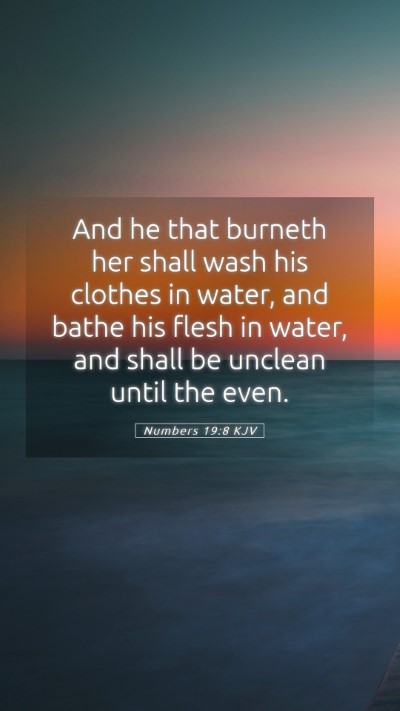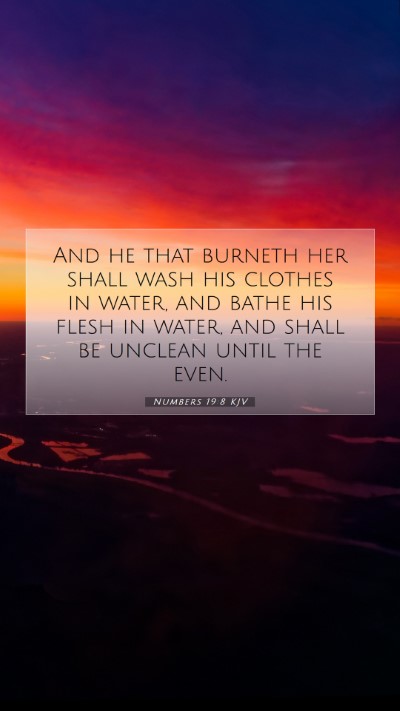Bible Verse Commentary on Numbers 19:8
Numbers 19:8 states: “And the one who burns it shall wash his clothes in water, and bathe his body in water, and be unclean until evening. Then the bull shall be burned in his sight; its hide, its flesh, and its dung shall be burned.” This verse is part of a larger passage detailing the ritual of the red heifer, which plays a crucial role in the purification rites within the Israelite community.
Summary of Key Elements from Public Domain Commentaries
This commentary draws from the insights of Matthew Henry, Albert Barnes, and Adam Clarke to provide a comprehensive understanding of this verse within the overall narrative of purification and holiness in the Old Testament.
Understanding the Context
The context of Numbers 19 addresses the laws surrounding ceremonial cleanliness, particularly the purification of those who come into contact with a dead body. This chapter is vital for the Israelites, who were instructed to maintain ritual purity to be in right standing before God.
Analytical Insights from Commentators
- Matthew Henry: He emphasizes that the rituals prescribed in this chapter highlight God's authority over life and death. The washing of garments and bathing signifies the need for inner and outer purity, reinforcing the idea that approaching God requires both a physical and spiritual cleansing.
- Albert Barnes: Barnes focuses on the practical application of the rituals, suggesting that they served as a constant reminder for the Israelites of the holiness of God and the importance of being clean before Him. His commentary points out that the burnt offering symbolizes total dedication to God.
- Adam Clarke: Clarke provides a historical perspective, noting that the red heifer was a unique offering with no parallel, signifying that there are certain divine mysteries that the Israelites were to accept without full understanding. He discusses how the procedure for dealing with uncleanness was to ensure community health and a proper relationship with God.
Symbolism in Biblical Rituals
The act of burning the red heifer and subsequent washing reflects not only the physical act of purification but also symbolizes the greater spiritual purification required for anyone who desires to approach God. The use of a heifer points to the sacrificial system prevalent in ancient Israel, where animals were used to atone for sins.
Application and Relevance
For modern readers, Numbers 19:8 serves as a reminder of the importance of spiritual cleanliness and the need for repentance before coming to God. This principle is echoed throughout the New Testament, where Jesus emphasizes the condition of the heart over mere external appearances.
Approaching Bible Study with This Verse
When studying Numbers 19:8, consider the following:
- What does this ritual teach us about God’s nature and expectations of His people?
- How does the concept of physical holiness parallel spiritual purity in today’s context?
- In what ways can we apply the principles of this verse to our daily lives and worship?
Cross References for Deeper Understanding
- Leviticus 11: Details laws concerning clean and unclean animals.
- Hebrews 9:13-14: Discusses the contrast between the blood of goats and bulls and the blood of Christ for purification.
- 1 Peter 1:16: Calls believers to be holy, reflecting God's holiness.
Conclusion
The examination of Numbers 19:8 not only deepens our understanding of Old Testament law and its significance but also helps us appreciate the continuous thread of the need for purity that runs throughout Scripture. Engaging in this study equips Bible study groups and individuals seeking to grasp the meaning of Bible verses with tools that enhance their spiritual journey.
By integrating commentary insights from observed theologians and applying their lessons, readers can achieve a richer understanding of Scripture, progressing from mere knowledge to a heartfelt application of God's directives in daily life.


